Attending the meeting were members of the National Council for Education and Human Resources Development, members of the Subcommittee; representatives of the Government Office, a number of ministries and branches; leaders of higher education institutions; and experts.
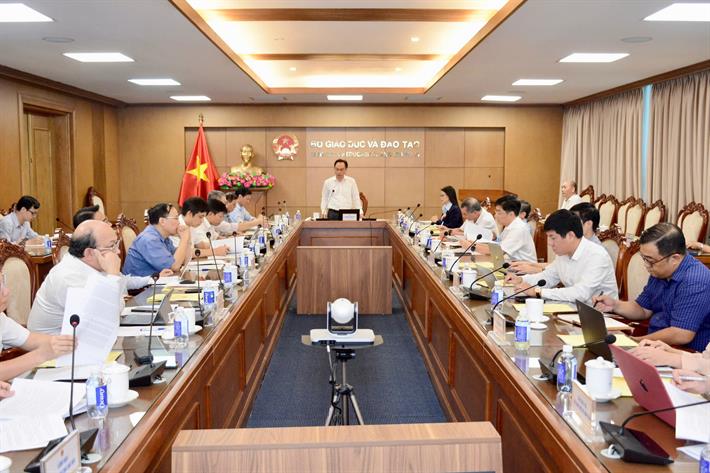 |
Session view
Reporting on the Draft “Project on training human resources to serve high-tech development in the period 2025-2035 and orientation to 2045”, Mr. Dang Van Huan, Director of the Higher Education Quality Improvement Project (SAHEP) said: The goal of the project is to prepare an abundant STEM human resource with high professional and technical qualifications to meet the needs of expanding investment in developing high-tech fields, especially a talented workforce capable of participating deeply in the research and development stage in a number of key technology fields.
High-tech human resources, especially a large team of experts in artificial intelligence and semiconductors, have become Vietnam's competitive advantage in attracting investment from large technology corporations in the world, contributing to the economic restructuring and sustainable development of the country based on science, technology and innovation, digital transformation and green transformation.
Sharing about the orientation to 2045, Mr. Huan said: The scale and proportion of STEM training will continue to increase. The teaching staff and facilities serving STEM training and research will be increased and developed to meet the standards of advanced countries. The scope and scale of STEM talent training programs will continue to be expanded to all priority technology fields.
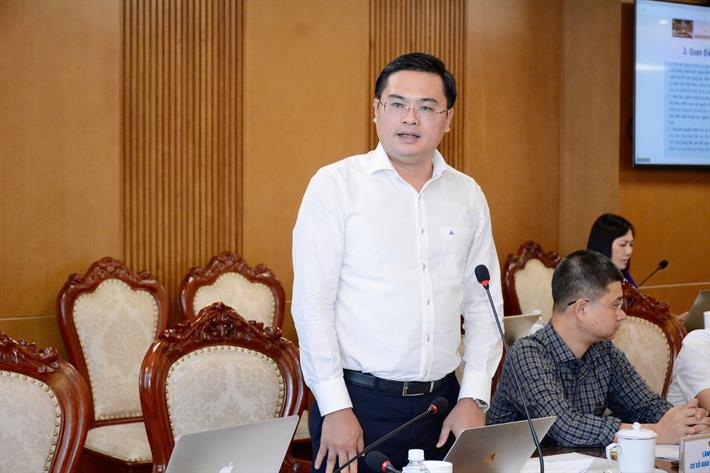 |
Mr. Dang Van Huan, Director of the Higher Education Quality Improvement Project, reported at the meeting.
Highly qualified and high-quality STEM human resources have become Vietnam’s core competitive advantage in attracting investment in high-tech sectors. Vietnam’s higher education system is ranked among the top in Asia in training and research in STEM fields, especially in digital technology, biointelligence and biotechnology.
Associate Professor Dr. Huynh Quyet Thang, Director of Hanoi University of Science and Technology, said that the project is an important strategy, guiding higher education institutions, especially STEM training schools, in developing, innovating, and improving the quality of training high-quality human resources.
Sharing the experience of Hanoi University of Science and Technology, Associate Professor Dr. Huynh Quyet Thang emphasized the need to ensure the following requirements: Clear program orientation for learners to make the right choice; training programs need to be scientifically developed, with a philosophy according to the purpose; need to have suitable and active partners to coordinate implementation; supplementary skills and foreign languages; build reputation and promote appropriately.
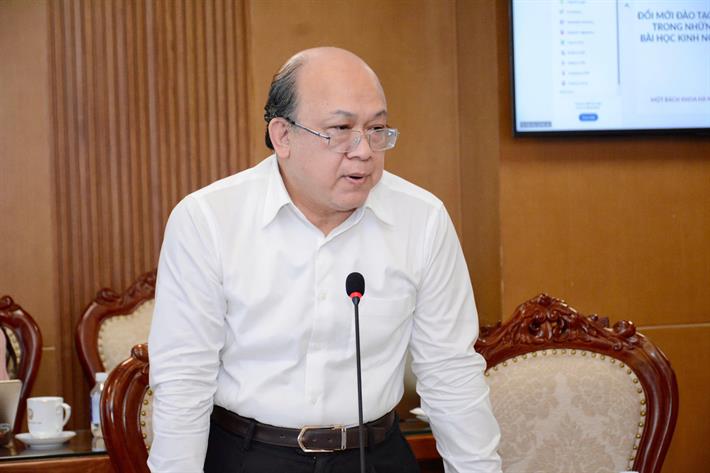 |
Associate Professor Dr. Huynh Quyet Thang, Director of Hanoi University of Science and Technology, discussed at the meeting
Agreeing with the project's objectives, Prof. Dr. Nguyen Dinh Duc, Chairman of the Council of the University of Technology, Vietnam National University, Hanoi, said: In 2012, the proportion of the university's engineering and technology majors accounted for only 8% of the enrollment target. By 2023, this proportion had increased to 31%. This is a remarkable achievement in improving the quality of training high-quality human resources.
However, currently, according to Prof. Dr. Nguyen Dinh Duc, the team of teaching and research staff in the field of high technology is still limited in quantity and quality; infrastructure and modern laboratories cannot keep up with advanced technologies in the world; strong research groups in the field of high technology are still very few; investment funding is still modest; recruiting foreign scientists with high quality is difficult; the strategy does not have human resource preparation for new technology industries...
Prof. Dr. Nguyen Dinh Duc said that to have good human resources, we need good experts to access the world's technology, and we need to develop a training orientation for experts in this field. At the same time, we need to promote cutting-edge high-tech research; effectively train foreign languages in universities; link with businesses in high-tech research and training...
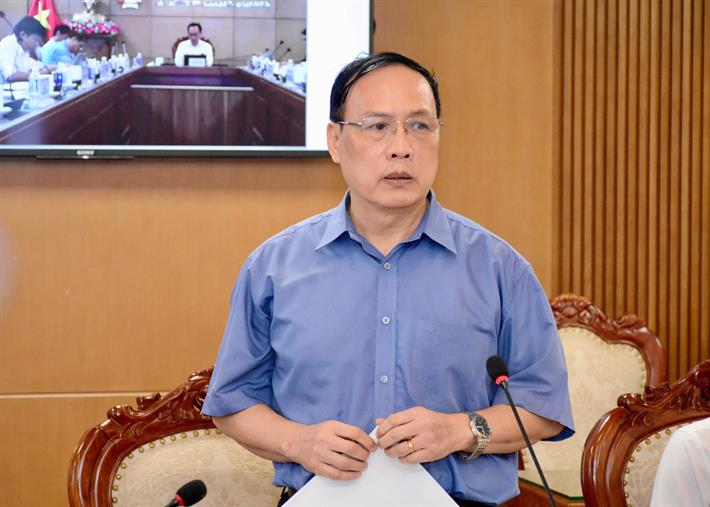 |
Prof. Dr. Nguyen Dinh Duc, Chairman of the Council of the University of Technology, Vietnam National University, Hanoi, discussed at the meeting
Prof. Dr. Nguyen Quy Thanh, Rector of the University of Education, Vietnam National University, Hanoi, proposed that it is necessary to clearly define high-quality criteria associated with the labor market, carefully analyze the economic structure and technology market until 2035 and the following years to have a suitable training program structure, along with the conditions for implementation, ensuring quality with high-quality programs.
Dr. Le Truong Tung, Chairman of the Board of FPT University, emphasized that there should be policies and mechanisms to attract students to study natural sciences right from high school in order to increase the quantity and quality, and find talents to train high-quality human resources.
Proposing to build a scientific research and innovation ecosystem, Prof. Dr. Tran Diep Tuan, Chairman of the Council of Ho Chi Minh City University of Medicine and Pharmacy, said that it is necessary to have an advanced production policy, attract prestigious international researchers; attract talented young people; have a clear mission in training real talent, developing research and innovation capacity.
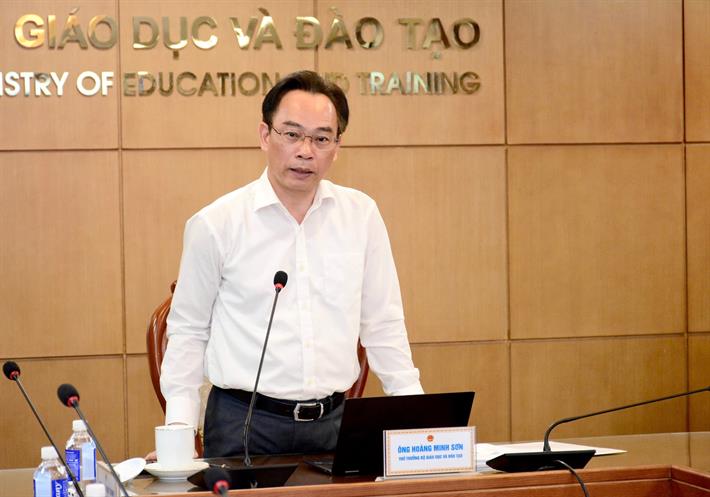 |
Deputy Minister Hoang Minh Son speaks at the meeting
Speaking at the meeting, Deputy Minister Hoang Minh Son thanked the delegates for their high consensus on the policy and orientation and their enthusiastic and practical contributions to the project through their recognition of the context, challenges and opportunities.
The Deputy Minister emphasized that developing human resources to work in high-tech industries is very important. The project was built based on the tasks assigned to the Ministry of Education and Training in a number of Government resolutions, decisions and directives of the Prime Minister.
The project covers a fairly wide scope but also needs to focus on the core strategic technology areas that need to be prioritized for development in the coming time, the combination of relevant ministries and branches, and coordination with businesses in training high-quality human resources.
The Deputy Minister also requested that higher education institutions be prepared and take necessary steps to meet the country's increasing needs. The editorial team and drafting committee need to absorb as much of the feedback as possible at the meeting, ensuring that it is general but specific enough to be successful.
Source: https://moet.gov.vn/tintuc/Pages/tin-tong-hop.aspx?ItemID=9842


![[Photo] National Assembly Chairman Tran Thanh Man attends the Party Congress of the Committee for Culture and Social Affairs](https://vphoto.vietnam.vn/thumb/1200x675/vietnam/resource/IMAGE/2025/5/11/f5ed02beb9404bca998a08b34ef255a6)















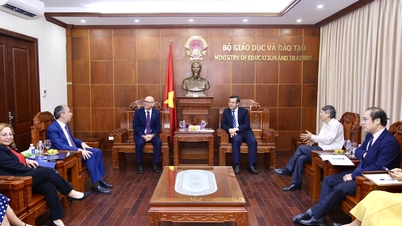
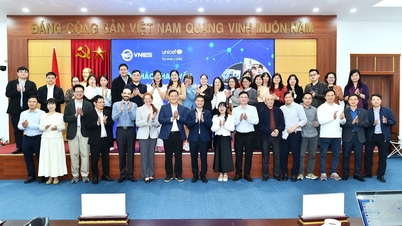
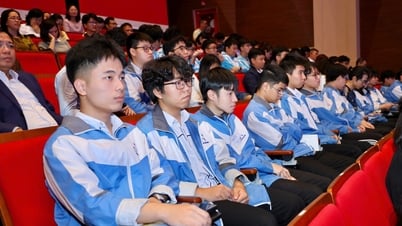


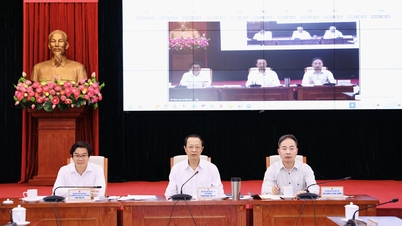
![[Photo] Discover the beautiful scenery of Wulingyuan in Zhangjiajie, China](https://vphoto.vietnam.vn/thumb/1200x675/vietnam/resource/IMAGE/2025/5/11/1207318fb0b0467fb0f5ea4869da5517)
![[Photo] National Assembly Chairman works with leaders of Can Tho city, Hau Giang and Soc Trang provinces](https://vphoto.vietnam.vn/thumb/1200x675/vietnam/resource/IMAGE/2025/5/11/c40b0aead4bd43c8ba1f48d2de40720e)





























































Comment (0)